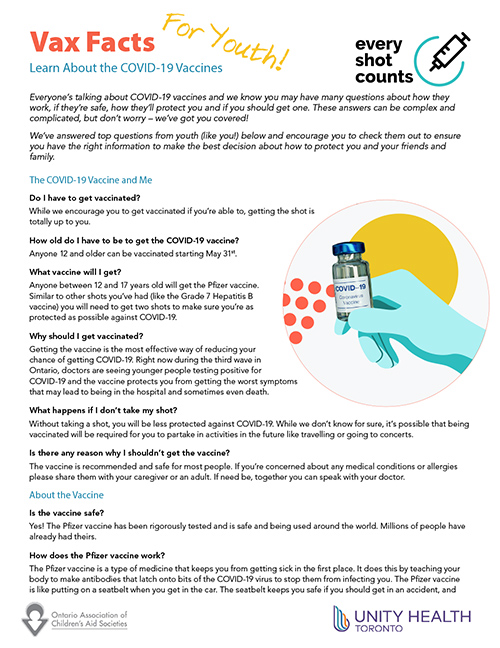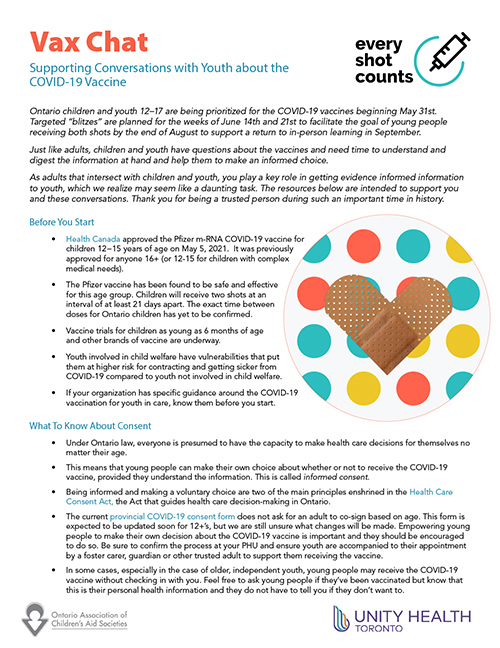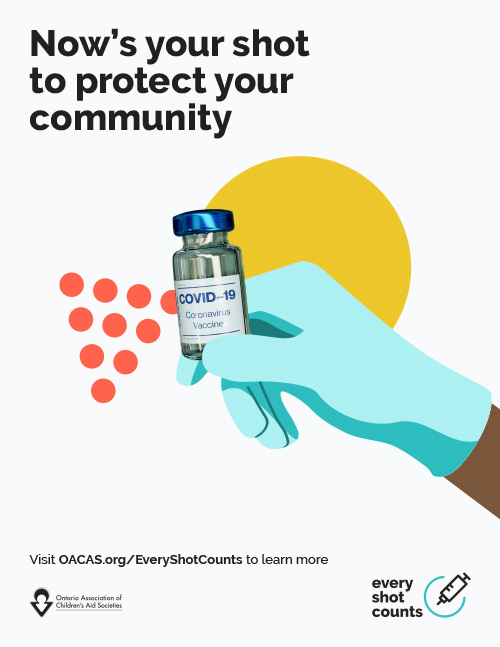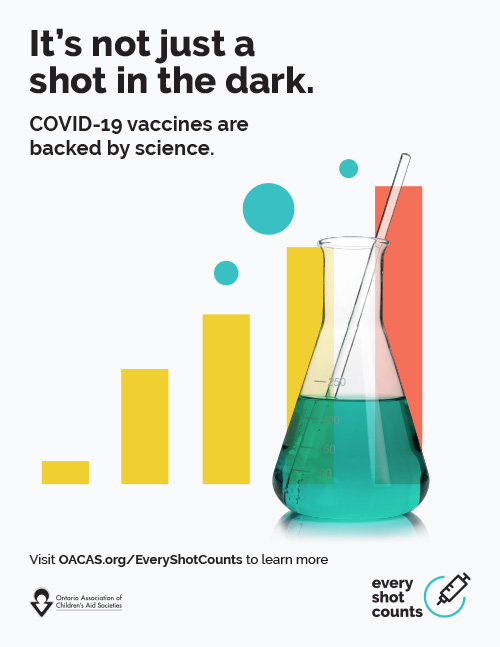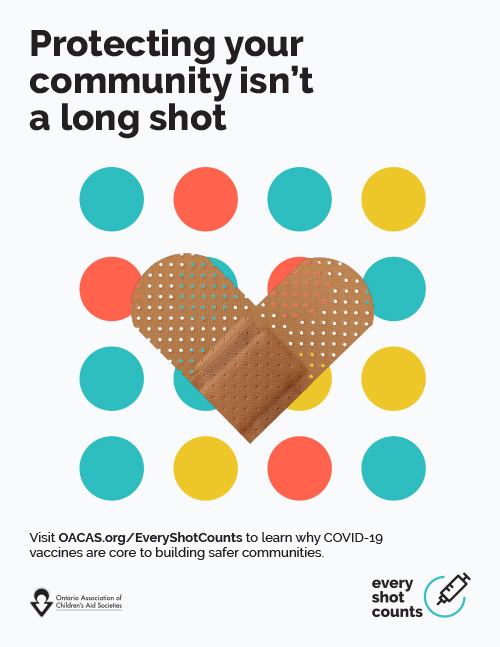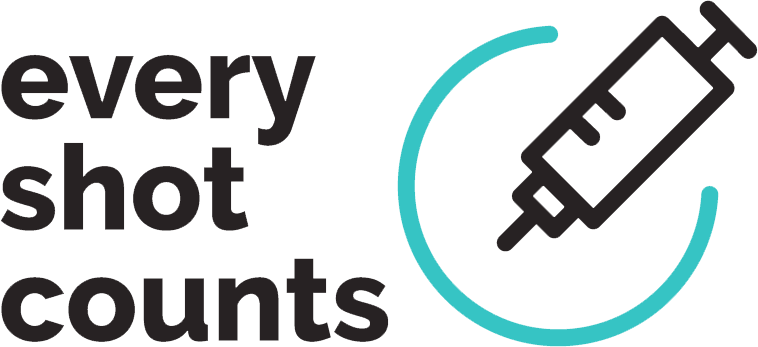
Now’s your shot to further protect vulnerable children, youth and families during the pandemic!
The Every Shot Counts campaign is aimed at providing Ontarians in the child welfare sector with the right education before vaccination. We know you’ve got questions and we’re here to support with credible, trusted answers and resources that help you make an informed choice about getting the COVID-19 vaccines.
Remember: With every shot, the people we serve are further protected!
Join the Campaign!
Join us in raising awareness about the important role that COVID-19 vaccines play in helping the child welfare community keep vulnerable children, youth and families safe.
Download our posters, social media graphics and sample messaging to promote the #EveryShotCount campaign and encourage your community to get educated and vaccinated if they can! Every poster and post provides a unique message, so we encourage you to use each one.
Social Media
Show off your shot!
By getting a COVID-19 vaccine you’re demonstrating that you care about protecting your community. Show off your shot with these social media posts and encourage others to join you!
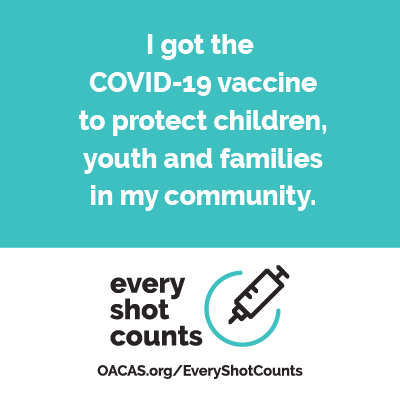
Follow the Conversation
Vaccine FAQ
No. You cannot be forced to get vaccinated, but some workplaces are choosing to make vaccination a condition of employment.
Child welfare staff, including those working in children’s residential spaces, as well as foster, kin and customary caregivers are articulated in Phase 2 of the province’s 3-staged vaccination plan that is scheduled to run from April to June 2021.
The exact timing of your own vaccine might depend on where you live, vaccine supply, and the type of role you have. You can read more about Phase 2 priority here.
We continue to advocate that everyone connected to a child or youth intersecting with child welfare receive the vaccine during Phase 2. By adopting an approach with the child/youth at the center, it will assist us to:
- minimize the risk of infection;
- prioritize the most vulnerable;
- resolve ongoing mental health crises being experienced by vulnerable children, youth, and families; and
- stabilize the service delivery to Ontario’s children and families.
Unfortunately, within that, there may be some determinations as to who qualifies first based on factors such as role, supply, and geography (for example, in Phase 1 they started vaccinating people in the areas with the highest rates of infection first), which mean you may have to wait.
You might be asked to wait if you aren’t in a client facing role or can work from home. But the good news is that although Phase 3 was expected to start in July, recent projections about vaccine supply have moved this timeline up. We now expect Phase 3, when vaccines are open to the general population, to be sooner, so you won’t have to wait much longer!
This varies by community and to be honest, is changing every day. It’s important to stay connected with your agency or your local Public Health Unit.
The goal is to increase the accessibility of clinics so there are many different options in communities ranging from offices to arenas. Many Public Health Units have already launched online booking sites and are piloting clinics at pharmacies and doctors’ offices.
Likely not. To date, people have not been given a choice of what vaccine to receive. Canada has contracts with several vaccine manufacturers with five currently available: Moderna, Pfizer, AstraZeneca, Covishield (developed by AstraZeneca), and Johnson & Johnson. It’s possible that more options will be approved before the end of the campaign, but which Public Health Unit gets what will depend on the needs of the community and their ability to store and administer it appropriately.
We aren’t sure. The logistics for Phase 3 are not yet known. Because of that, and in line with public health advice, our recommendation is to be vaccinated as soon as possible to avoid illness and help safeguard the sector and the vulnerable populations we serve.
Immunocompromised people, pregnant, or breastfeeding women are currently not excluded from receiving the vaccine. However, this decision should be discussed with your treating physician to understand if receiving the vaccine is right for you.
No. The government of Canada is paying for the COVID-19 vaccines.
The current consent form has a spot for your Health Card number so if you don’t have a valid Ontario health card and/or do not have permanent status in Canada, it is suggested that you raise this ahead of time (where possible) with the vaccine clinic to understand any individual processes that may apply. But you are still eligible!
Organizations will each have their own policy on this matter, so please check with your organization’s HR Department for information specific to your circumstances.
Fortunately, we know from Public Health that the adverse effects from the COVID-19 vaccine are generally mild. If this is an issue for you post-vaccine, contact your organization’s HR Department to understand your entitlements specific to your circumstance.
The answers to these questions will depend on circumstance and role, and they should be directed to your organization’s HR department.
If you know now that you are unable to take the vaccine due to medical, religious, or other reasons, we suggest discussing it with your employer or the organization you work with as soon as possible.
Safe and reliable vaccines can help protect you, your family and community from COVID-19 which, to date, has killed over 2.6 million people worldwide. Vaccines are an important tool to help stop the spread of the virus, build immunity in Ontario, and allow us to safely resume normal life.
When a large percentage of the population becomes immune to COVID-19, the spread of the virus will slow down or stop.
We know there is misinformation out there that can be alarming. We encourage everyone to take the time to become educated on the COVID-19 vaccine.
Dr. S. Ranade, the Medical Officer of Health for the County of Lambton and Lambton Public Health did a ‘Vaccine 101’ presentation for almost 1,300 people from the sector on March 8 and answered lots of these questions. If you missed it, you can watch it here.
Resources
- Ontario’s COVID-19 vaccination plan (Updated Regularly)
- Phase 2 (April 2021)
- What Every Canadian Should Know about the COVID-19 Vaccine (March 2021)
- COVID-19 vaccine in the workplace (February 2021)
- Maad’ookiing Mshkiki | Sharing Medicine; First Nations, Inuit Métis Perspectives & Knowledge Sharing on COVID-19 Vaccines (February 2021)
- The COVID-19 Vaccine Communication Handbook (February 2021)
- Vaccine Information Sheets in 15 languages (March 2021)
- Vaccine Comparison, Health Debate (March 2021)
- COVID-19 Updates for Child Welfare: Vaccines for Kids, Omicron, and More
- Town Hall with Dr. Upton Allen: The COVID-19 Vaccine and Black Children and Youth (July 21, 2021)
- Behavioral Science Working Group Presentation: Child and Adolescent COVID-19 Vaccination with Dr. Gilla Shapiro (July 5, 2021)
- The COVID-19 Vaccine Plan for Children and Youth with Dr. Anne Wormsbecker (May 20, 2021)
- COVID-19 Vaccine Discussion with Dr. Colin Lee (May 7, 2021)
- Dr. S. Ranade, Medical Officer of Health for the County of Lambton and Lambton Public Health (March 8, 2021)
- Nightly (8-10PM EST) Zoom info sessions/Q+A’s Complete the registration form here to join.
- How Black health leaders took on COVID’s impact on Black communicates and vaccine hesitancy (March 11, 2021)
- The York Region Alliance of African Canadian Communities is hosting Dr. D. Burt for a session entitled The COVID-19 Vaccine and the Black Community: the History, the Hesitancy, the Vaccination on April 17 from 11-12:30 PM. Register here.
- What to Expect Post Vaccine Maad’ookiing Mshkkiki | Sharing Medicine Project (March 2021)
- What to Expect After the COVID-19 Vaccine? from @covidvaccinefacts
- How long with COVID-19 Vaccine Immunity Last? from @covidvaccinefacts
- For Indigenous Youth, Maad’ookiing Mshkiki – Sharing Place, has a number of resources
- For Black youth, OACAS’s One Vision One Voice team produced Conversations with health leaders about the COVID-19 vaccine.
- United Health Network Sanctuary Comics: How the COVID-19 Vaccines Work, Guide to Getting Vaxxed, and How Did They Make the Vaccine So Fast?
- Educating Kids about the COVID-19 Vaccine, Boston Children’s Hospital
- Busting Myths about the COVID-19 Vaccine, Holland Bloorview Hospital
- COVID-19 vaccine: Does it work? Is it safe? When can kids get it?, CBC Kids News
Webinars for Youth
- Dr. Andrew Morris, an infectious disease physician and co-author of the Sick Kids reports: COVID-19 Guidance for School Reopening, hosted a webinar with Q+A for youth on February 17 and answered lots of questions about COVID-19 and the vaccines. You can watch it here.
- Dr. Sunit Ranade, the Medical Officer of Health for Lambton County who did a fantastic webinar on COVID-19 vaccines for the child welfare sector on March 8, also has a series of 3 videos called: COVID-19 Vaccine Questions with Kids. Watch it here.
- @covid19vaccinefacts, written by Canadian doctors in plain language with new content posted regularly.
- @punjabikidshealth, written by an ON pediatrician about kid’s health generally with a good COVID-19 section. Bilingual, youth friendly resources in English and Punjabi.
Tiktok
The purpose of Vax Facts is to provide up to date, credible information about the COVID-19 vaccination process in Ontario. Please feel free to also use these resources to augment your local discussions about vaccinations. If you have a resource that you think the sector would benefit from, send it to covid19@oacas.org.
- Programs and Resources
- OACAS 2025 Pre-Budget Submission
